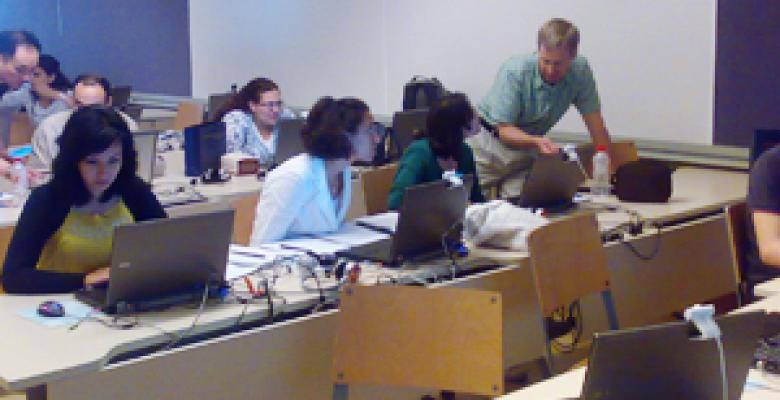Political Science Team Leads Statistical Modeling Workshop Against Backdrop of Egyptian Elections

As the eyes of the world focused on Egypt’s transition to democracy, Columbia University political science faculty members conducted a quantitative research workshop for aspiring social scientists at The American University in Cairo just weeks before Egypt’s historic presidential elections.
The Columbia faculty team included professors John Huber, chair of the department; Robert Shapiro, a public opinion survey expert; and Jack Snyder, a specialist in international relations, who introduced 50 graduate and undergraduate students to basic quantitative and qualitative techniques used to develop and test political science theories.
“This workshop brought together several of the best methodologists in American political science with some of the most engaged and engaging students and activists in Egypt today,” said Lisa Anderson, the president of American University Cairo and dean emeritus of Columbia’s School of International and Public Affairs. “The seminal importance of political change in Egypt today infused the workshop with urgency and timeliness.”
The intense three-day program, held June 3 to 6, began with an overview by Snyder, the Robert and Renee Belfer Professor of International Relations, on “The Social Science of Political Development: A Window on the Arab Spring.” Subsequent sessions illustrating different aspects of the Arab Spring included, democracy and Islam, Islam and women’s empowerment, ethnic voting or democratization and conflict. The research questions were supported by required readings.
During the sessions, Shapiro explained how to understand the variables that affect public perceptions of current events and policy issues. Students were introduced to Stata, a computer software program that enabled them to apply statistical analyses to data sets from several studies that were discussed, along with public opinion survey data supplied by Huber and Shapiro.
According to Professor Clement Henry, chair of American University’s political science department, the idea for the workshop came together when Anderson, who remains the James T. Shotwell Professor Emerita of International Relations at Columbia, invited her former colleagues to present a workshop on political science methodologies. The Columbia team developed the curriculum in consultation with AUC professors Gamal Soltan, former director of the Ahram Center for Political and Strategic Studies and a pioneer of Egyptian opinion surveys; and Jee-Kwang Park (GSAS’05), who will begin teaching statistical methodologies at American University in Cairo this fall.
“Those who attended—at least two thirds of whom were women—were very interested in seeing what they could learn in three days and what the possibilities were in gaining some understanding about—and applying—statistical methods,” said Shapiro. “We emphasized how this could be used to study political development in ways potentially relevant to the Arab Spring.
“I think we succeeded in doing what Lisa Anderson and Clement Henry intended in inviting us: to jumpstart interest in using quantitative data and statistical methods to pose and examine empirically causal arguments concerning politics.”